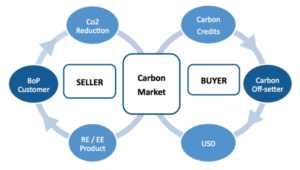
Image: daiwashiryotrading.com
Introduction
In the heart of South Africa, where the radiant sun casts its golden rays, a profound shift is taking place—a testament to our nation’s unwavering commitment to a greener, more sustainable future. Carbon credit trading, an innovative mechanism that empowers individuals and corporations alike, has emerged as a beacon of hope in the quest to mitigate climate change. This transformative concept, rooted in collaboration and responsibility, unlocks the potential to reduce carbon emissions and accelerate the transition towards a low-carbon economy.
What is carbon credit trading? Simply put, it is a system that allows organizations that emit greenhouse gases to offset their emissions by investing in projects that reduce or remove carbon from the atmosphere. These projects can range from renewable energy and energy efficiency initiatives to reforestation and carbon capture and storage technologies. By participating in carbon credit trading, corporations can not only demonstrate their environmental stewardship but also contribute directly to projects that benefit our planet.
The Significance of Carbon Credit Trading for South Africa
South Africa stands at a pivotal juncture in its climate journey. As a country heavily reliant on coal-fired power plants, we face significant challenges in reducing our carbon footprint. However, the advent of carbon credit trading presents a transformative opportunity. By tapping into this global marketplace, South African entities can generate revenue by selling surplus emission reductions, providing them with a financial incentive to embrace more climate-friendly practices. In turn, this creates a virtuous cycle that drives investment in renewable energy projects and low-carbon technologies, ultimately reducing the nation’s greenhouse gas emissions and fostering economic growth.
How Carbon Credit Trading Works
The carbon credit trading process is designed to be transparent and accountable, ensuring the integrity and credibility of the system. Carbon credits are measured in tons of carbon dioxide equivalent (CO2e) and represent the reduction or removal of one ton of greenhouse gas. Entities earn carbon credits by investing in projects that reduce emissions or sequester carbon from the atmosphere. These projects are then verified and certified by independent third-party organizations, ensuring that they meet stringent environmental standards and deliver real, measurable climate benefits.
Benefits of Carbon Credit Trading
-
Environmental Conservation: Carbon credit trading provides a tangible mechanism for organizations to contribute to the fight against climate change by financing projects that reduce or remove greenhouse gas emissions. This helps mitigate the effects of global warming, protect ecosystems, and ensure a healthier planet for future generations.
-
Economic Growth: Carbon credit trading creates new economic opportunities by stimulating investment in renewable energy, energy efficiency, and other low-carbon technologies. By participating in the carbon market, businesses can generate additional revenue streams, attract environmentally conscious investors, and enhance their brand reputation.
-
Technological Innovation: The demand for carbon credits drives innovation in the development and deployment of low-carbon technologies. This stimulates the growth of new industries and creates jobs, contributing to a more sustainable and prosperous economy.
Expert Insights
“Carbon credit trading is an essential tool in the global fight against climate change. It provides businesses with a financial incentive to reduce their emissions and invest in sustainable solutions. South Africa has a critical role to play in this global effort, and carbon credit trading can empower our nation to transition to a low-carbon future while driving economic growth.” – Dr. Joanne Yawitch, climate scientist and director of the South African Centre for Carbon Capture and Storage.
Actionable Tips
-
Businesses: Explore investing in carbon credit trading as a way to reduce your organization’s environmental impact, generate revenue, and contribute to the nation’s climate goals.
-
Individuals: Demand carbon neutrality from corporations and products you support. By choosing brands that prioritize sustainability, you can drive the adoption of low-carbon practices and create a positive impact on the planet.
Conclusion
Carbon credit trading is not simply a market transaction; it is a powerful tool that can transform our relationship with the environment and empower South Africa to become a leader in sustainable development. By embracing this innovative mechanism, we can harness the potential of capitalism to drive positive environmental change, creating a legacy of environmental stewardship for generations to come. Let us join hands, invest in a low-carbon future, and pave the way for a cleaner, greener, more prosperous South Africa.

Image: ag.purdue.edu
Carbon Credit Trading South Africa






